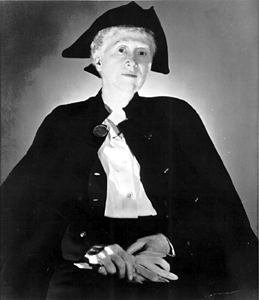
Marianne Moore's place in the pantheon of Modernist poets is assured. She belongs in the company of Eliot, Williams, Pound, Stevens, Yeats on the strength of her revolutionary, stylistically daring, and exquisitely intelligent verse. And yet her work is strikingly different from all her male counterparts, who came to prominence after the First World War, so much so that it may almost seem that she occupies a position unique to herself.
Whereas Eliot, Williams, Pound, and Stevens wrote an augmented free verse line based on the dramatic potentials of a liberated voice, Moore turned instead to strict, eccentric, forms as rigid, and frequently difficult of execution, as anything before in history. In what sense, then, is Moore "modern" as opposed to traditional?
Perhaps the question becomes clearer if we look at the work of Ron Silliman, or Barrett Watten. Later developments, as T.S. Eliot pointed out, often validate or make clearer early works, by showing how they work, how they "fit" into time's advance. The present can change the past. Take a work like Ketjak, or Watten's Progress.
Each of these late post-Modern works employs a strict form--particularly Watten's--with its own specific formal design. That design is subjective and a priori: It doesn't flow from the requirements of the "content" but is imposed from without, quite deliberately, even synthetically. One could with justice say that the form of each of these poems is completely arbitrary: There is nothing "inside" the poems which dictates the necessity of these forms. This kind of artificiality is exactly the quality you find in Moore's most innovative poems, such as (choosing at random), "The Jerboa," "The Fish," "To a Steam Roller" and so forth.
Strict, even constricting form is in fact a hallmark of much post-Modern art. Think of Philip Glass, or Steve Reich. Think of I.M. Pei, Renzo Piano.
The truncation of obdurate form against intractable subject is in fact what provides interest, especially when the "syntax" of construction (in all senses across the spectrum of media) is superficially illogical or arbitrary.
The construction of a Moore poem depends upon a high degree of improbability (or stress) between a decorative form, and the appropriation of a technically exact, though frequently frivolous descriptive. It's almost an insolent quality. Williams had proposed poems defined as "new additions to nature"--suggesting that poems could have an organic unity of design as inevitable and logical as a living plant. Moore's poems are like literary mutations, growing out of a genetic code that is pre-ordained, and superficially odd; like animal forms, they exhibit certain symmetries, and are only constructed to function in one way, i.e., they can't be rearranged to suit another preference.
The Fish
wade
through black jade.
Of the crow-blue mussel-shells, one keeps
adjusting the ash-heaps;
opening and shutting itself like
an
injured fan.
The barnacles which encrust the side
of the wave, cannot hide
there for the submerged shafts of the
sun,
split like spun
glass, move themselves with spotlight swiftness
into the crevices--
in and out, illuminating
the
turquoise sea
of bodies.
--and so on. The pleasure we take in such elaborately eccentric stanzaic structures has little to do with the inherent qualities of their subjects. This is one valid complaint against traditional craft employments, that they are merely the pretext for the exercise of a verbal dexterity--a trivial skill without connection to worldly compulsions or necessities. What makes Moore--despite the uniqueness of her structural forms--different from, say, Swinburne or Tennyson? Could we imagine Berryman's Dream Songs, or Berrigan's Sonnets, without Moore's deviations, her slavish experiments in syllabics?
In Moore these tensions produce delight, a breathtaking awe. When you finish one of her poems, nothing is left.
In Watten's Progress, or Silliman's Ketjak, the pleasure of the text is incidental. Negation,* as a quality of ironic abandonment, is the dominant emotional undercurrent. Intersections of event and syntactic accident are treated as gratuitous, as if the poem were discovering connections accidentally. The lack of an evident permission to treat materials as if the world made sense, like the alienation of the possessed (Dostoevsky). It's a little like listening to an atonal opera inside a medieval cathedral: The form of the space as an ordination, the elastic flow of the sound a complex concatenation of discordant echoes; the mapped graph of those irremedial refractions.
*Negation, at least as Watten has defined it in several places: Meaning a contrast to a prevailing mode--i.e., individuality, originality, difference, contrast, resistance, opposition, etc.
[End Part One]

5 comments:
Have you ever tried to make a poem like Moore's complex syllabic structures?
Superficially, it looks easy. Parodic imitations are seductive.
But Moore's taxonomic quality of definition, of an ordered formality which is "inevitable" (while not being predictable) isn't bought cheaply. You have to know your subject inside and out, and then you have to be INspired to realize it inside these arbitrary shapes and measures.
I sometimes wonder what kind of poet she might have been in mid-19th Century. Like Dickinson?
Moore's difference isn't in degree of difficulty. I didn't say that. Her difference is in making up eccentric structures which are quite as demanding as any "traditional" ones.
Pound is obviously a prosodic master, able to adapt his gift to a wide variety of models. But he wasn't an inventor of forms. At least not in the way Moore was. There's a sense of arbitrariness of Moore's poems, which is partly their strength and modernity.
"But he wasn't an inventor of forms. "
Hmm. If you mean not an inventor of arbitrary forms, ok. Otherwise, no.
I think it was this paragraph that got me:
"Whereas Eliot, Williams, Pound, and Stevens wrote an augmented free verse line based on the dramatic potentials of a liberated voice, Moore turned instead to strict, eccentric, forms as rigid, and frequently difficult of execution, as anything before in history."
Post a Comment